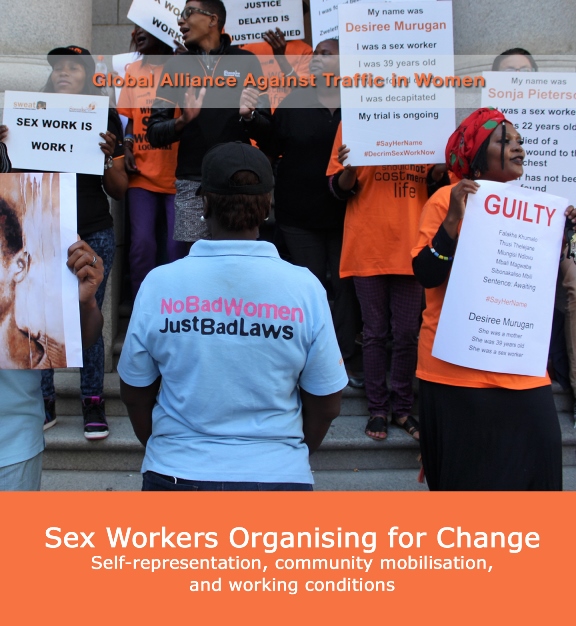español polski svenska français italiano português руский deutsch
Sex worker rights organisations are creatively responding to violence, exploitation and other abuses within the sex industry, including instances of human trafficking, according to a new report published by the Global Alliance Against Traffic in Women, Sex Workers Organising for Change: Self-representation, community mobilisation and working conditions.
The report is based on research conducted with sex worker organisations in seven countries: Canada, Mexico, Spain, South Africa, India, Thailand and New Zealand. It highlights cases where sex workers, or sex worker organisations, learnt of situations where a woman was experiencing violence, working under unacceptable conditions, or was brought to the industry through force or deception, for the purpose of exploitation. In these instances, sex workers resolved the issue as a collective, by providing advice and referral to other organisations, negotiating with the brothel owner/madam, chasing the pimp out of their area, or gathering money to help the woman return home.
Beyond support for individual cases, this report also documents how sex worker rights organisations mobilise sex workers and their allies to resist stigma, discrimination and oppression, and to collectively voice their concerns, demand their rights, and participate in public and political life. This type of collective action builds confidence in sex workers and helps them better protect themselves and their peers against violence and abuse.
Despite this important work, sex worker rights organisations are largely unrecognised and even vilified by the anti-trafficking community. In the past decade, the role of workers’ associations and trade unions in preventing and addressing human trafficking in different sectors of the economy has increasingly been recognised by anti-trafficking stakeholders. It is now widely acknowledged that organised workers are empowered workers. However, sex worker rights organisations are generally viewed with suspicion by anti-trafficking activists and, as a result, excluded from anti-trafficking responses. In some of the studied countries, we found that the contribution of sex worker organisations for anti-trafficking work was recognised by at least certain individuals in the local police or anti-trafficking unit. However, we also documented several cases where sex worker organisations had tried to join their national anti-trafficking task force or NGO network, but were either not allowed to or had to withdraw due to hostility.
Ultimately, the report demonstrates that sex worker rights organisations are human rights organisations whose primary mandate is to ensure that the human, economic, social, political, and labour rights of the people they work with are recognised and respected by state and non-state actors. We hope that it will lead to a new approach to addressing human trafficking in the sex industry—one that is based not on criminalisation and indiscriminate “raids and rescues” but on meaningful engagement with those in the industry themselves.
Downloads:
New Zealand Nueva Zelanda - español
India (English) मराठी (Marathi)
Spain (English) España - español
Mexico (English) México - español

